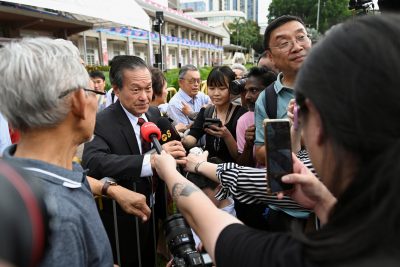 Economics, Politics and Public Policy in East Asia and the Pacific
Economics, Politics and Public Policy in East Asia and the PacificSingapore’s ‘fake news’ fixer risks undermining public confidence
24 October 2023Author: Howard Lee, Murdoch University
Touted by the Singaporean government as a way to protect society in an increasingly polluted digital environment, the Protection from Online Falsehoods and Manipulation Act (POFMA) has both addressed the ‘scourge of fake news’ and shielded the government from criticism.

In effect since October 2019, POFMA predominantly employs ‘correction directions’ demanding that the author of an alleged falsehood display a government statement alongside the original article so that readers can make up their own minds about the truth. Failure to comply with the correction direction can result in penalties and access blocking orders to prevent users in Singapore from accessing the article. In September 2023, an access blocking order was imposed on East Asia Forum for non-compliance with a correction direction, in a concerning sign that the law’s impact extends beyond national borders.
In the lead up to and following its passing, the government has described POFMA in various ways — a no-brainer, a torchlight for the truth and an essential online fire safety equipment. In defending the law, the government assured the public that it will affect only a minuscule segment of the population and those against it were crying wolf.
Many expressed concern about the law’s potential impact on academic freedom — concerns that the government swiftly dismissed. Journalists also raised concerns about the law infringing on freedom of expression. Others who raised concerns included civil society groups, the opposition Workers’ Party, legal experts and the tech industry, all of whom the government has repeatedly dismissed.
Of the many issues surrounding the law, two are the most problematic in terms of diminishing public discourse — government misuse to protect itself from criticism and the interpretation of ‘falsehoods’.
Already in its four year lifespan, POFMA has been deployed at least 78 times, highlighting its significant role in regulating Singapore’s online media environment.
The government’s defence of POFMA has centred on the need to counter falsehoods that are detrimental to the ‘public interest’. As defined by the government, public interest pertains to six areas — national security, public health, finance and safety, foreign relations, election interference, inciting social tensions and a diminution of public confidence in the government.
While POFMA directions do not explicitly indicate the applicable condition, a count of POFMA directions leading up to and during Singapore’s 2020 general election suggests that most directions relate to the sixth condition — diminution of public confidence.
A recipient of a POFMA correction direction who stood by their original statement faced defamation suits from the ministers named in the statement. The punitive nature of POFMA does little to dispel concerns that the government uses it to shield itself from criticism.
While the government has laid claim to the truth in every use of POFMA, not every case is clear cut. In 2020, the opposition Singapore Democratic Party was issued a POFMA direction when it criticised the government’s employment policies. As the case unfolded in court, it became a matter of how specific terminology could be interpreted — in this case whether ‘local employment’ referred to jobs for citizens only or also included permanent residents. Even after the court ruled partially against the POFMA direction, the government relentlessly insisted on its version of the truth.
The supposedly clear distinction between fact and opinion has become more complex with each application of the law. A POFMA direction issued to digital magazine Jom over an article about potential government conflict of interest came down to the court deciding on ‘an assertion of fact made by the author in order to support his opinion’.
Such practices do little to encourage nuanced introspection within Singaporean society. At worst, it portrays the government as intolerant of criticism and public scrutiny, and unwilling to have open conversations with citizens about its governance.
Media laws in Singapore have had a lasting and powerful influence largely because the government has consistently adhered to two principles — laws have been used judiciously and every use has been convincingly justified. But justifying each POFMA direction is insufficient to legitimise it, as these justifications do not affirm the fairness of the use of the law but rather just insist that the government was right.
Over-reliance on POFMA will have potentially negative consequences on Singaporean society. More than suppressing free speech, POFMA affects the ability of Singaporean society to process information and believe that the government makes decisions with their interest in mind. The harm of POFMA on Singapore’s public life is ultimately more detrimental than the many alleged falsehoods the law seeks to counter.
Howard Lee is a lecturer in the School of Media and Communication at Murdoch University, Perth.
